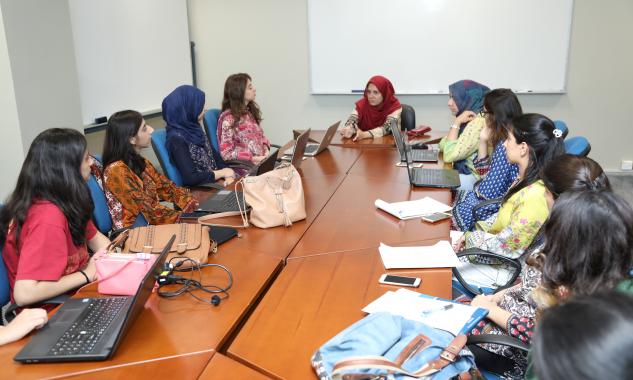
The Social Enterprise Development Centre (SEDC) at the Suleman Dawood School of Business (SDSB), Lahore University of Management Sciences (LUMS) inaugurated their six week Summer Trainee Programme this June, in collaboration with the Punjab Commission on the Status of Women (PCSW). The programme was devised as an immersion platform for students interested in pursuing careers in the development sector.
Since 2001, SEDC has worked on gender mainstreaming and social inclusion in Pakistan. To this end, the Traineeship was aimed at enhancing the capacity of students to better address the needs of the development sector; particularly focusing on developing technical research and writing skills. The students were taught to prepare factsheets and policy briefs on various areas of research.
The factsheets were used to shed light on Healthcare Service Delivery in Pakistan, Primary Schooling in Pakistan, Enrolment, Dropout Rates and Out-of-School Children in Public Primary Schools, Youth Unemployment in Pakistan and Financial Inclusion in Pakistan. Factsheets also focused on women’s issues including Women and Agriculture in Pakistan, Maternal Healthcare in Punjab and Domestic Violence against Women in Pakistan.
The policy briefs focused on topics such as Urbanization in Pakistan: The Availability of Housing, Poverty Alleviation through the Benazir Income Support Programme, Child Malnutrition in Punjab, Women and Agriculture in Pakistan, Domestic Violence against Women in Pakistan and Primary Healthcare Service Delivery System in Punjab.
The PCSW was engaged to add a practical dimension to the programme. Securing women’s rights and empowerment are central to the work of the PCSW and mirror the cross-cutting theme of SEDC. Therefore this formed the underlying basis for the research studies conducted by the trainees. The trainees were sent to work in the field on PCSW projects as well as at their headquarters. The exposure gained through involvement in professional work settings served to familiarise them with the demands of the sector.
Among the topics assigned was the Access to Criminal Justice System for Women in Punjab. The purpose of this research was to ascertain reasons for the undue delay in conviction in criminal cases of violence, especially rape and “honour” killings committed against women. It analysed the causes of non-prosecution in such cases, and provided a set of recommendations to be shared with all stakeholders to improve the accessibility of the criminal justice system for victims.
The Audit of Punjab Safe Cities Authority (PSCA)’s Women Safety Smart Phone Application was also unpacked to assess its utility and recommendations to further improve the initiative for better safety measures for women in Punjab.
Additionally, the long-term impact of crime on women victims of violence was assessed to determine the physical, socio-economic and psychological impact on women. For primary research, PCSW’s Transitional Home for Women Victims of Violence, Darul Aman, and Human Rights Centre for Women in Lahore were engaged. This research was aimed at the development of victim advocacy toolkits including procedural norms for all stakeholders involved to protect the rights of victims.
The Prevention of Electronic Crimes Act 2016 (PECA) was evaluated to assess the impact of this legislation following its promulgation last year. The desk review conducted in this area of research to analyse the Act was based on academic literature and expert reviews. Data on crimes reported to the Federal Investigation Agency (FIA) and other official sources was collected to gauge its effectiveness.
The traineeship will culminate in a September Policy Forum, where students will be given an opportunity to present their policy briefs to policymakers, development sector professionals and academics. This will also provide them with critical networking opportunities. SEDC’s trainee programme will serve as a launching pad for students hoping to work in the nonprofit sector, industry and the policy world.
To learn more about SEDC, please click here.








